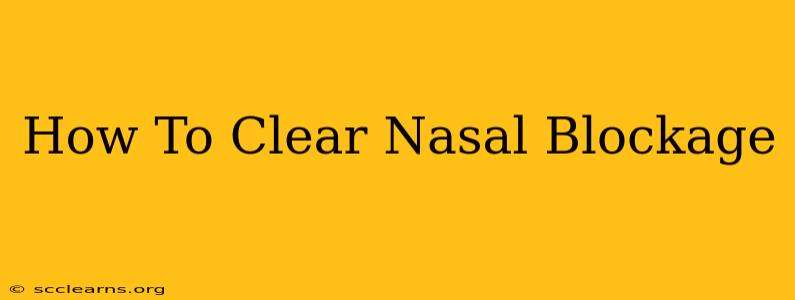A stuffy nose is incredibly frustrating. Whether it's due to a cold, allergies, or the dry air of winter, a nasal blockage can make it difficult to sleep, eat, and even just breathe comfortably. Fortunately, there are many things you can do to clear your nasal passages and get back to feeling your best. This guide will explore effective home remedies and when to seek professional medical advice.
Understanding Nasal Blockage
Before diving into solutions, it's helpful to understand what causes nasal blockage. Common culprits include:
- The Common Cold: Viral infections inflame the nasal lining, leading to congestion.
- Allergies: Pollen, dust mites, pet dander, and other allergens trigger inflammation and mucus production.
- Sinusitis: Inflammation of the sinuses can cause pressure and blockage.
- Dry Air: Low humidity dries out the nasal passages, leading to irritation and congestion.
- Nasal Polyps: Noncancerous growths in the nasal passages can obstruct airflow.
- Deviated Septum: A bent nasal septum can partially block one nostril.
Home Remedies for Nasal Blockage Relief
Many effective methods can help alleviate nasal congestion. Here are some popular and readily accessible options:
Hydration is Key:
Drinking plenty of fluids is crucial. Water thins the mucus, making it easier to drain. Warm liquids like broth or herbal tea can be especially soothing.
Saline Nasal Spray or Rinse:
A saline solution washes away irritants and mucus, helping to clear the nasal passages. You can purchase pre-made saline sprays or make your own using distilled water and salt. Neti pots are another popular option for nasal irrigation. Always use distilled or sterile water to avoid infections.
Steam Inhalation:
Inhaling steam helps loosen mucus. Add a few drops of eucalyptus oil or menthol to the steaming water for added relief (use caution with essential oils and always ensure the water is not too hot to prevent burns).
Elevate Your Head:
Elevating your head with extra pillows while sleeping can help drainage and reduce congestion.
Humidifier:
A humidifier adds moisture to the air, preventing the nasal passages from drying out.
Warm Compress:
Applying a warm, damp compress to your forehead and sinuses can help soothe inflammation and relieve pressure.
When to See a Doctor
While home remedies are often effective, it's essential to seek professional medical attention if:
- Your nasal congestion persists for more than 10 days.
- You experience severe pain or pressure in your sinuses.
- You have a fever or other symptoms of a serious infection.
- You notice green or yellow mucus.
- You have difficulty breathing.
A doctor can diagnose the underlying cause of your nasal blockage and recommend appropriate treatment, which might include medication such as decongestants or antibiotics.
Preventing Nasal Blockage
Preventing nasal blockage involves addressing potential triggers and maintaining good respiratory health:
- Manage Allergies: Identify and avoid your allergens. Consider allergy testing and medication.
- Stay Hydrated: Drink plenty of water throughout the day.
- Avoid Irritants: Minimize exposure to smoke, dust, and other irritants.
- Maintain Good Hygiene: Wash your hands frequently to prevent the spread of infection.
By understanding the causes of nasal blockage and utilizing effective home remedies, you can significantly alleviate discomfort and breathe easier. Remember that persistent or severe symptoms warrant a visit to your doctor for proper diagnosis and treatment.

